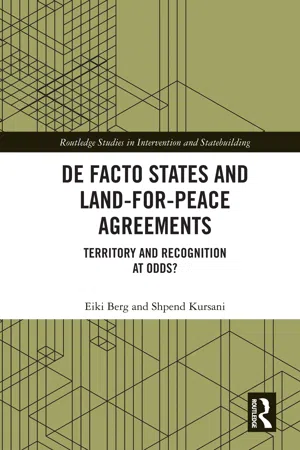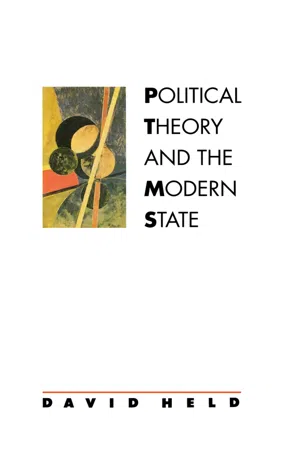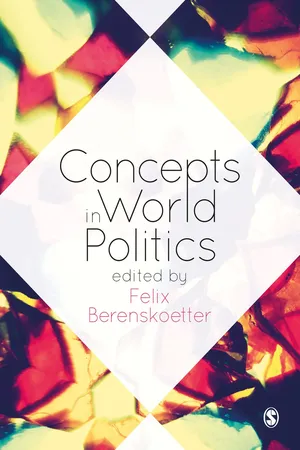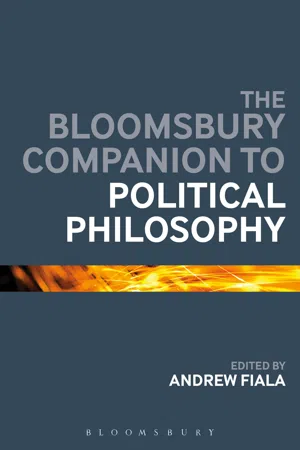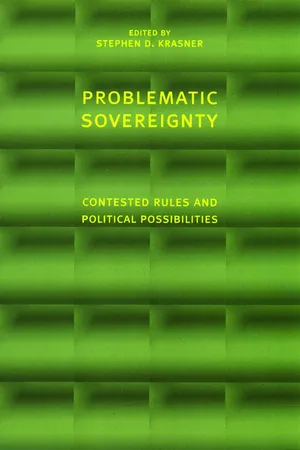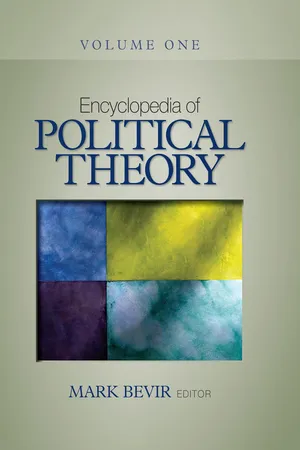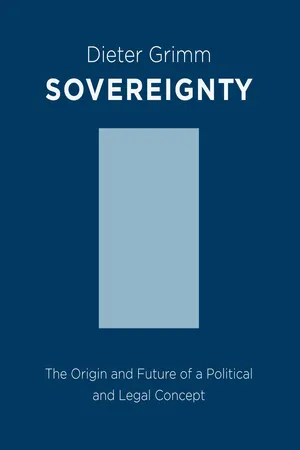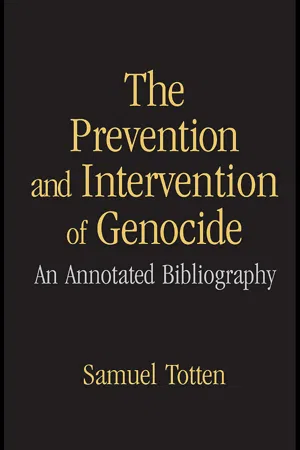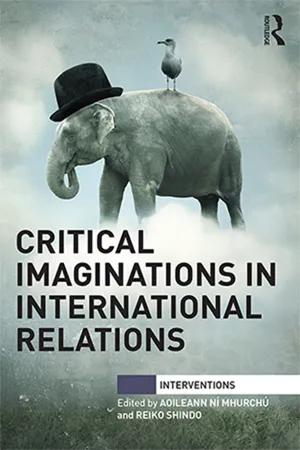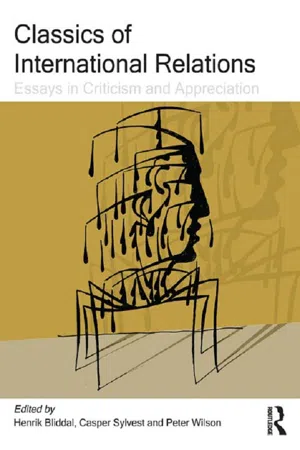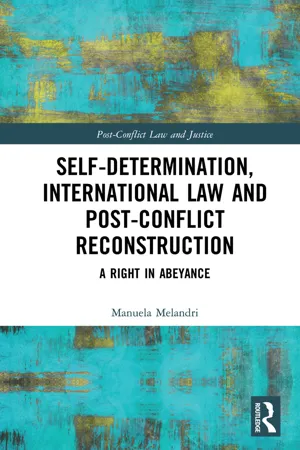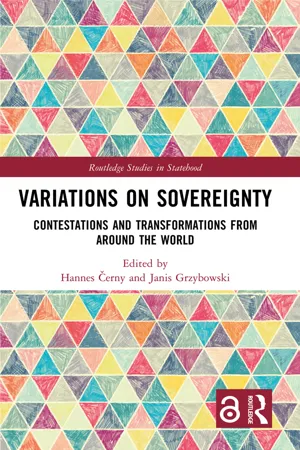Politics & International Relations
State Sovereignty
State sovereignty refers to the exclusive authority and autonomy of a state within its territorial boundaries, free from external interference. It encompasses the state's ability to govern itself, make laws, and engage in international relations. This principle is a cornerstone of the modern state system and is often invoked in discussions of international law and diplomacy.
Written by Perlego with AI-assistance
Related key terms
Related key terms
1 of 4
Related key terms
1 of 3
12 Key excerpts on "State Sovereignty"
- eBook - ePub
De Facto States and Land-for-Peace Agreements
Territory and Recognition at Odds?
- Eiki Berg, Shpend Kursani(Authors)
- 2021(Publication Date)
- Routledge(Publisher)
Lake (2003 ) has also attempted to empirically capture deviations in how sovereignty can be observed, suggesting that sovereign units in world politics often fall under hierarchical networks and structures depending on the issue area and the very units participating in the international system. Nevertheless, the principles of territorial integrity and non-interference provide a regulatory framework that allows us to at least seek a balance between the two (internal/external) sides of sovereignty—either in a Hobbesian manner, that is, in terms of whether a state is recognised by its counterparts, or in a Lockean one, which sees in the sovereign a body constituted by the people who, at any time, may choose to revoke the authority or jurisdiction of their creation.Regardless of its varying forms and applications in different contexts, State Sovereignty is far from being irrelevant as a matter of international politics. As a status and legal standing, sovereignty covers authority and right. As ‘an enabling act’ from international society (Taylor 1999 , 559), sovereignty gives ‘a right to be heard’ in international affairs (Jackson 1999 , 455). Whether sovereignty is also founded in power and capability (in addition to law) is a matter of recognising sovereignty-creating acts supported by empirical evidence on the ground. As a whole, it is possible to single out entities that are sovereign from those that are not while identifying different sources of State Sovereignty: constitutional independence, empirical attributes of statehood, and recognition as a state (Kurtulus 2005 , 51). For example, constitutional independence, on the one hand, applies to absolute conditions since ‘a constitution is a set of arrangements which has the force of law’ (James 1999 , 40). Empirical attributes of statehood, on the other hand, reveal sovereignty exercises in practice and refer to situations existing in a matter of degree or relative terms (Clapham 1998 ). Hence the view that ‘a conception of legal rights reflects the materialisation of these rights, and that the existence of factual sovereignty within a delimited piece of territory, is antecedent to the acquisition of juridical sovereignty over that same territory’ (Kurtulus 2005 - eBook - ePub
- David Held(Author)
- 2013(Publication Date)
- Polity(Publisher)
While the history of the concept of sovereignty in modern times has been marked by further dispute and complexity, it can be argued that it has generally affirmed the location of sovereignty in the political community or body politic as a whole; the necessary embodiment of sovereignty in a constitution (written or unwritten); and the necessary articulation of sovereignty by a set of rules and relations which marks and delimits both state and society (see Jouvenal, 1957; James, 1986). In keeping with these emphases, ‘sovereignty’ has come to be defined, as it was, for example, in one recent encyclopaedia of political thought, as ‘the power or authority which comprises the attributes of an ultimate arbitral agent – whether a person or a body of persons – entitled to make decisions and settle disputes within a political hierarchy with some degree of finality’ but ‘bound by some rules from which it cannot free itself (King, 1987, p. 492, p. 495). Further, sovereignty by its very nature implies a degree of independence from external powers and dominance or ultimate authority over internal groups. In modern democratic states, it has come to be recognized that sovereignty is the supreme law-making and decision-taking power of a community, that the ultimate source of sovereignty is the people, that sovereignty is necessarily delegated by the people to the state and exercised on their behalf through government, and that constitutional arrangements or well-established precedents are necessary to safeguard these political goods.The sovereign equality of states
In the international context, sovereignty has involved the assertion by the state – whether it be democratic or not – of independence; that is, of its possession of sole rights to jurisdiction over a particular people and territory. This ‘external’ dimension of sovereignty has, in addition, been associated with the claim that, by virtue of the very argument which establishes the sovereignty of a particular state, that state must accept that it will be one among many states with, in principle, equal rights to self-determination. In the world of relations among states, the principle of the sovereign equality of all states has, since the early years of the nineteenth century, become paramount in the formal conduct of states toward one another (see Hinsley, 1963). And in this world, it is Hobbes’s way of thinking about power and power relations which has often been regarded as the most insightful account of the meaning of sovereignty at the global level (see, for example, Aron, 1966). - eBook - ePub
- Felix Berenskoetter, Felix Berenskoetter(Authors)
- 2016(Publication Date)
- SAGE Publications Ltd(Publisher)
This disciplinary practice notwithstanding, the notion of sovereignty as “supreme authority” is not necessarily tied to the state as bearer of that authority. As the Oxford English Dictionary reminds us, sovereignty used to be linked to relations of supremacy more generally, e.g. between God and His creation, between husband and wife, or between the King and his people. Moreover, in modern democratic discourse it is the people who have supreme authority (“popular sovereignty”), which they in turn delegate to their government. However, in both IR and diplomacy, sovereignty is wedded to the state, which also still counts as a key actor in world affairs. This link between statehood, sovereignty and agency is reconfirmed in international law. The 1933 Montevideo Convention defines “the state as a person of international law” based on: (a) permanent population; (b) defined territory; (c) government; and (d) the capacity to enter into relations with other states. While other entities have limited international personality (e.g. the UN and the Holy See), to date only states qualify as legal subjects with sovereignty rights and duties, based on mutually exclusive territorial jurisdictions. This territorial identification of sovereignty, based on a separation of inside and outside, is also reflected in the UN Charter in the principles of sovereign equality (article 2(1)), territorial integrity (article 2(4)) and non-intervention (article 2(7)).The territorial grounding of sovereignty goes back to Jean Bodin (1530–1596), who allegedly invented the term souverainité to describe the shifting configuration of rule and authority from medieval to modern society. In the Middle Ages, authority was divided between the Pope and the Holy Roman Emperor, and Respublica Christiana operated on the basis of overlapping feudal power structures based on how far one’s power could reach. Modern society, on the other hand, is organized on the basis of exclusive, state-based authority defined by sacrosanct borders: there is only one sovereign in each territory. In traditional IR historiography, the Peace of Westphalia 1648, counts as the mythical birthday of the modern state system. The Westphalian system is typically and casually identified by several Latin axioms: “cuius regio, eius religio” (he whose region, his religion), “rex in regno sui est imperator regni sui” (the king in his kingdom is emperor of his realm) and “per in parem imperium non habet” (among equals nobody rules). Together, these mottos highlight the territorial logic of sovereignty, which links supremacy and hierarchy inside to independence and equality outside. This basic ordering principle sought to end the continuous fights over power and authority in the Respublica Christiana - eBook - ePub
- Andrew Fiala, Andrew Fiala(Authors)
- 2015(Publication Date)
- Bloomsbury Academic(Publisher)
Some want control in autonomous regions within a sovereign territory; others contest for supremacy in the whole of a state’s territory. A related problem is that ethnic, religious, and other affiliations transcend national borders, creating claims to authority, loyalty, and obedience that point beyond national boundaries and sovereignty understood in political terms. Nonetheless, the international system in the postcolonial era is based upon a community of sovereign nations, which assumes that each state has an equal sovereign right to self-governance and self-defense. The notion of sovereign equality idea is foundational in the United Nations Charter, which stipulates in Article 2, Paragraph 1: “The Organization is based on the principle of the sovereign equality of all its members” (also see Article 78). Sovereign equality in international law views states externally, treating them as individual entities. This means that domestic political arrangements of states are ignored (along with internal disputes and minority claims), with the status of sovereign statehood providing equal recognition at the international level. The emphasis on sovereign equality is pluralistic. It aims toward a system in which states with quite different domestic arrangements are equally recognized as having a certain political status. This notion has been described and defended as a form of sovereign state realism, which accepts State Sovereignty as a fact of political life. From this perspective, once a sovereign power is established and acknowledged by the international community, there is no justification for foreign interference. Such interference is conceived as a violation of sovereignty. Critics of this approach will argue that this permits rogue states and outlaw regimes to have an equal place at the international table - eBook - ePub
Problematic Sovereignty
Contested Rules and Political Possibilities
- Stephen Krasner(Author)
- 2001(Publication Date)
- Columbia University Press(Publisher)
The widespread claim that State Sovereignty is in decline reflects an inadequate understanding of the concept of sovereignty. Sovereignty is a political theory about the locus of authority in the national polity, and the principle that the state constitutes this locus is deeply institutionalized in world and national structures. In the globally dominant theory, the state derives its sovereignty from the ultimate source of authority, “the people,” and it exercises that sovereignty on the people’s behalf. Loss of sovereignty would therefore imply the assumption of authority and jurisdiction in the national territory by some body or organization other than the state. Such cases are not unknown; in recent years, we have seen the United Nations establish authoritative control of a number of national polities in which the state has collapsed, and in some cases (e.g., the United States in Haiti, NATO in Kosovo) the United Nations has authorized other actors to assume authority in disorderly countries. In all such cases, however, the primary goal has been the reestablishment of a functioning sovereign state exercising jurisdiction over a reconstituted national polity under democratic political structures, in line with the doctrine of State Sovereignty derived from the citizenry. In no case in recent decades have we observed the formal incorporation of a national polity under the jurisdiction of an external state or IGO, or the concession of sovereignty to a tyrant or oligarchy, as the generally desired resolution of a state crisis.While the principle of State Sovereignty stands firm, the array of external actors and forces that impinge on the state and influence state policy and behavior has expanded rapidly. States must manage an increasingly intrusive and powerful external environment, and to succeed as states (that is, to actualize the general model of the properly constituted and functioning state) they must enmesh themselves ever more thoroughly in international and global structures and flows. By and large, however, despite the numerous instances of state breakdown or collapse, states’ capacity to manage their national polities has increased in tandem with the increasing complexity and integration of the world polity. States must deal with ever more problems, and they have ever greater resources and organizational muscle to do so. States may have to run just to keep in place, but they keep on running rather steadily even though they often seem to be struggling. - eBook - ePub
- Mark Bevir(Author)
- 2010(Publication Date)
- SAGE Publications, Inc(Publisher)
poststructuralists have argued that the concept of sovereignty instead is constitutive of modern political order through its usage in academic and political discourse. By implication, sovereignty is believed to be historically contingent and profoundly mutable, rather than a necessary condition of domestic and international political order.Such a diagnosis of course begs the question of alternative principles of order. But like many earlier attempts to contest sovereignty, the recent criticism of sovereignty tends to presuppose exactly what it sets out to criticize, namely, that there is, or at least has been, something like indivisible and absolute political authority out there in the first place. Thus, the concept of sovereignty, along with all its traditional core connotations of supremacy, territoriality, indivisibility, and absoluteness, nevertheless continues to exercise a powerful influence on contemporary political imagination, to the point that alternatives either seem totally out of reach, or, when inspected more closely, carry features similar to that of the good old sovereign state.As some recent scholarship has suggested, much of the endurance of sovereignty as an organizing principle of modern political life depends as much on claims to sovereignty being raised by various agents as it does on such claims being perpetually contested by others. From this point of view, the concept of sovereignty derives its meaning from being used to legitimize claims to supreme authority in various contexts. But even if we accept that the meaning of sovereignty is a matter of usage, this implies that its normative import depends on the acceptance of those conventions governing its usage by those audiences recognizing or rejecting such sovereignty claims.Something similar goes for attempts to relocate sovereignty to the global level, which despite their aspirations often remain premised on the notion that political authority needs to be both bounded and centralized in order for a political community to be possible. Hence, and symptomatically, the present contestation of sovereignty seems to be exactly what keeps this concept very much alive within political science and international relations theory. But by focusing squarely on sovereignty and the question of its endurance, recent critics have left some more basic questions of political authority—questions that the concept of sovereignty once was invented to address—unanswered. To be able to answer these questions without presupposing that political authority needs to be territorial, or that communities have to be bounded, remains one of the main challenges to political science and academic international relations today. - eBook - ePub
Sovereignty
The Origin and Future of a Political and Legal Concept
- Dieter Grimm, Belinda Cooper(Authors)
- 2015(Publication Date)
- Columbia University Press(Publisher)
This solution was not available, however, for federal entities—in particular for federal states—because federal states are constituted from individual states; therefore the distribution of state power cannot be limited to the level of its exercise, but extends to the level of the holder. The federal state thus remained a constant source of irritation for the doctrine of sovereignty. Yet it was the actual existence of federal states that forced a deeper reflection on sovereignty and produced a significant number of variants of the concept—some of them monist, some dualist. Given the distribution of sovereign rights between states and international organizations, these variants have gained renewed significance today.With the emergence of the constitutional state, the step to depersonalization of sovereignty was complete. When fully formed, it could recognize only democracy as the legitimating principle for political rule. Sovereignty thus meant popular sovereignty. The people were not capable of acting politically, however. Sovereignty therefore found expression only in the act of constitution making. The powers connected with sovereignty were exercised by delegates or representatives as derived powers. This made it easier to reconcile sovereignty with limitations of power, because the limitation took place only below the level of sovereignty, at the level of its exercise.Something similar is now happening at the international level. An international legal order is emerging that no longer depends exclusively on self-determination by states but is imposed on them regardless of their consent. To this extent, parallels may be observed with the constitutionalization of state power, which likewise occurred as a transition from self-limitation by the absolute ruler to a limitation on political rule by way of legal norms emanating from a source other than the ruler and not at his disposal.6 - eBook - ePub
The Prevention and Intervention of Genocide
An Annotated Bibliography
- Samuel Totten(Author)
- 2008(Publication Date)
- Routledge(Publisher)
State Sovereignty: Change and Persistence in International Relations. University Park: The Pennsylvania State University Press. 212 pp.In his introduction to the book, Hashmi write as follows:This book is comprised of the following chapters: “Introduction” by Sohail H. Hashmi; chapter 1. “Ideas and the Evolution of Sovereignty”; chapter 2. “Pan-Islamism, State Sovereignty, and International Organization” by So-hail H. Hashmi; chapter 3. “Sovereignty, Self-Determination, and Security: New World Orders in the Twentieth Century” by Beatrice Heuser; chapter 4. “New Approaches to International Human Rights: The Sovereign State Revised” by Gregory H. Fox; chapter 5. “Clash of Principles: Self -Determination, State Sovereignty, and Ethnic Conflict” by Kamal S. Shehadi; and chapter 6. “Shared Sovereignty, Enhanced Security: Lessons from the Yugoslav Wars, and State Sovereignty” by Miranda A. Schreurs.For at least fifty years, students and practitioners of international politics have been . . . analyzing the changing changing nature of State Sovereignty. Traditional conceptions of the unitary, absolute, and legitimate state—the Westphalian model of sovereign statehood—were to some being “eroded,” while to others were already “obsolete.”. . . Yet reports of the demise of the sovereign state have thus far proven to be greatly exaggerated. For at the time that the erosion of the Westphalian model was occurring on the continent that gave birth to it, the principle of State Sovereignty was being enshrined universally as the organizing principle of international society. The Third World states that emerged from the retreat of Western colonialism in the 1950s and 1960s did not challenge the essential structure of the international system; instead they embraced it wholeheartedly and have sought not an overhaul, but internal reform. The notion of State Sovereignty has, in fact, been the badge of international legitimacy for states and regimes enjoying at best dubious internal legitimacy. . . . Today, [though] the problem of State Sovereignty has emerged squarely at the center of a maelstrom of international issues. . . . - eBook - ePub
- Aoileann Ní Mhurchú, Reiko Shindo(Authors)
- 2016(Publication Date)
- Routledge(Publisher)
And as Walker and Mendlovitz (1990 : 1) continued shortly thereafter, ‘its meaning might be marginally contestable by constitutional lawyers and other connoisseurs of the fine lines, but for the most part State Sovereignty expresses a commanding silence’, a contention later reiterated by other critics of sovereignty (Weber 1996 : 2, 11). As Biersteker and Weber (1996 : 3) pointed out, the argument made on the contrary was that ‘the modern state system is not based on some timeless principle of sovereignty, but on the production of a normative conception that links authority, territory, population … and recognition in a unique way and in a particular place (the state)’. An important task for these scholars was to re-open the question of sovereignty in order to understand how and why this silence had been maintained within international relations. As Ashley and Walker (1990 : 383) argued, ‘the word “sovereignty” is often used ideologically, as if it represented some source of meaning, some effective organizational principle, some mode of being already in place, some simply and self-evidently given resolution of paradoxes of space, time, and identity’. Yet they argue that sovereignty is contingent; they do so by pointing out that ‘discourses of sovereignty cannot relate to their object, sovereignty, as other than a problem or question. This is so because sovereignty enters discourse not as a matter of describing something that is thought to be real, already present, and perhaps distinguishable from other equally real and present things, but precisely as a reflection on a lack, on a loss, on something that might have been but is no longer’ (ibid.: 381) - eBook - ePub
Classics of International Relations
Essays in Criticism and Appreciation
- Henrik Bliddal, Casper Sylvest, Peter Wilson, Henrik Bliddal, Casper Sylvest, Peter Wilson(Authors)
- 2013(Publication Date)
- Routledge(Publisher)
On the basis of the modern logic of inside/outside, IR is commonly reduced to a choice of either/or — a choice between the eternal game of relations between sovereign states or the possibility of finding some kind of universal community beyond the state. This choice, which is often framed as a choice between realism and idealism, both reflects and affirms the limits of the modern logic of inside/outside. Specifically, it reflects and affirms the spatial ontology of the sovereign territorial state as an indisputable starting point for thinking about politics. While answers to questions about ‘where we should go from here’ may vary, it is nevertheless this particular starting point, informed by specific assumptions of ‘where we are now’, that defines the limits of the questions and, consequently, the limits of the answers provided by theories of IR.The problem of sovereignty
While there may be increasing evidence that processes of globalization can no longer be contained within the borders of the state, the principle of State Sovereignty continues to provide the main horizons for thinking about politics in the late modern world. According to Walker, sovereignty seems to be ‘quite uninteresting, the preserve of legal scholars and constitutional experts rather than the subject of heated exchanges among social and political theorists’ (p. 62). However, one of the core thematics of Inside/outside is an emphasis on how this concept is far from straightforward and indeed should be treated precisely as a problem rather than a static principle or ‘thing’.In part, sovereignty relates to practices that attempt to create something out of nothing: for example, the attempt to secure a clear ‘presence’ of the state in the ‘absence’ of any foundations thereof. Precisely because there are no secure or ultimate foundations upon which the sovereign state can rest, the very notion of a ‘ground’, ‘origin’ or ‘foundation’ must be produced. Rather than relying on an ahistorical understanding of State Sovereignty as a simple given, Walker emphasizes that we need to analyse it in its historical context as ‘an historically specific account of ethical possibility in the form of an answer to questions about the nature and location of political community’ (p. 62). Moreover, in order to explain the persistence of this principle it is necessary to think of sovereignty not in relation to some kind of pre-established ‘essence’ or ‘meaning’, but rather as a discursive practice that continuously reproduces ‘it’ as an organizing principle of modern political life. It is precisely on the basis of such practices that IR in a rather paradoxical sense can be understood both as an outdated discipline and - eBook - ePub
Self-Determination, International Law and Post-Conflict Reconstruction
A Right in Abeyance
- Manuela Melandri(Author)
- 2018(Publication Date)
- Routledge(Publisher)
57 At the time of its insertion in Article 2 of the UN Charter, the principle was discussed by Sub-committee I/1/A and kept in the text on the assumption and understanding that it conveys the following:- (1) That states are juridically equal;
- (2) That they enjoy the rights inherent in their full sovereignty;
- (3) That the personality of the state is respected, as well as its territorial integrity and political independence.58
- (4) The territorial integrity and political independence of the state are inviolable;
- (5) Each state has the right to choose and develop its political, social, economic and cultural systems.59
Again, the overlap between the scope of self-determination rights and rights attached to the principle of sovereign equality is self-evident in each of these points, but particularly in point (5), concerning the freedom to choose a political system.Hence, it is undisputable that self-determination overlaps, in terms of scope, with other fundamental principles of international law. However, the argument here is that this overlap is only partial and does not cover all aspects of self-determination. As we have seen above, the scope and content of self-determination as the right of the people of a state is more articulated than a right to non-interference or a right to choose and develop its political system. Self-determination includes both of these provisions at the same times, as well as a right to participation and representation on behalf of the people as a whole. All in all, it is the amalgam, the entirety of these entitlements that constitutes self-determination, and it is in this respect that the uniqueness of the right comes to play. Viewing self-determination in its complexity and as a whole, is essential to understand its uniqueness in international law. - eBook - ePub
Variations on Sovereignty
Contestations and Transformations from around the World
- Hannes Černy, Janis Grzybowski, Hannes Černy, Janis Grzybowski(Authors)
- 2023(Publication Date)
- Routledge(Publisher)
continents such as Africa, Asia, Eurasia, Oceania, Mediterranean, Indopacific; quasi-historical embodiments of civilizations and traditions such as Western Europe, Christendom, or the West, and manifestly confected mental representations, such as Third World or Global South, which in practice appear either as the gestures of political defiance, or as the vehicles of scholarly criticism. The way in which we ‘enframe our world’ (Onuf 2018, 9) is no more dependent on the symbolical form of sovereignty, the invisible matrix of statehood, and the physical receptacle of territory, than it is on the categories of thought which make them intelligible in the first place, and whose obscurity prevents them from being imagined otherwise. In order to trace its contours, we need to start from a notion with which we are fully familiar. In a Territorial State Rather than a concept, ‘sovereignty’ is a tightly knit conceptual family whose members, like the members of most such families, can be identified by their last name. Or – as is the case with the family of ‘sovereignty’ concepts – by a word which names a quality exhibited by the concrete instantiations of other concepts. From that perspective, the sovereignty that today figures as an object of intense scholarly scrutiny may be seen as the culmination of a historical process during which the authority that was initially vested in individual rulers first became administratively centralized, territorially localized, and then institutionally depersonalized, functionally differentiated, self-consciously moderate(d) and, eventually, judicially circumscribed
Index pages curate the most relevant extracts from our library of academic textbooks. They’ve been created using an in-house natural language model (NLM), each adding context and meaning to key research topics.
Explore more topic indexes
Explore more topic indexes
1 of 6
Explore more topic indexes
1 of 4
